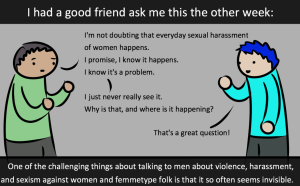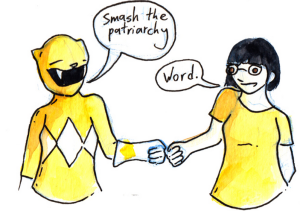
Source: NBC News
“Why should I pay higher taxes so that some lazy poor person can pick up another unemployment check and then go back to sitting on the couch and spending my money?”
Sound familiar?
Unfortunately, most of us have heard this anti-welfare sentiment many times before, from sources both expected (a new Tea Party candidate) and surprising (a colleague or friend).
The most recent Census data shows that about 48.5 million people, or 16% of the population, are living in poverty.
This is the fourth consecutive year that the poverty rate has increased. The recession pushed millions of Americans into poverty, and although the economy is now improving, wages are still lagging, and people continue to struggle nationwide.
For many, the only recourse is to turn to safety net programs like the Supplemental Nutrition Assistance Program (formerly known as food stamps), child care assistance, TANF, and unemployment benefits, to name a few.
These government programs exist to help those in need – and they really work, lifting millions out of poverty every year.
Still, many Americans would rather pretend poverty isn’t an issue in our country.
Worse yet, they’d prefer to blame low-income people for their status while supporting plans to dismantle the safety net.
So, How Did We Get Here As a Nation?
1. Even the Middle Class Has Turned on the Poor
How did it come to pass that many Americans of average education and income rail against welfare and vote for politicians that promise to cut entitlement spending and lower taxes?
These same people don’t seem to notice that corporations like General Motors, Apple, and Verizon evade billions in taxes every year or that their monumentally rich CEO’s pay lower effective tax rates than their secretaries.
That’s billions of dollars in revenue that the government doesn’t get.
And this wealth just doesn’t trickle down the way some would have you believe.
Nor do critics of the safety net appear to consider the billions of dollars spent annually on defense or the often wasteful use of resources in the Pentagon budget. In 2012 alone, defense spending accounted for 19% of government expenditure.
And yet, these issues are not the problem, they say. It’s that 12% of government spending on safety net programs that will break the bank.
2. Racism, Class Privilege, and Society
Black and Hispanic people were hit hardest by the recession.
But these minority groups were already struggling long before the recession’s arrival and are historically more impoverished than Caucasians.
So why are people of color disproportionately poor?
Let me give you a hint: it has nothing to do with “laziness.”
Racial oppression has created a cycle of poverty so encompassing that it invariably affects all people of color, despite immense gains in civil rights over the last fifty years.
White privilege is not imaginary either.
And yet people born outside of the deeply powerful system of racial oppression are often happy to make wildly outrageous and untrue claims about the work ethic or morality of minorities.
How many of them have ever taken a minute to consider where they would be if they had been born into an entirely different socioeconomic status?
3. The “Pull Yourself Up by Your Bootstraps” Mantra Is Bullshit
Not everyone is born with equal opportunities.
Some people are born with a trust fund and a summer house in the Hamptons.
Some are born to a single-parent low-income family in a city slum.
I’d like someone to rationally explain to me how factors such as your family situation growing up, your level of education, the job opportunities you are handed, the rate of crime and drug use in your neighborhood – and so many other similar factors that shape our young lives – aren’t supposed to affect a child’s future.
How is a poor kid who has to drop out of high school to help care for her younger siblings supposed to “pull herself up by her bootstraps” when she lives in a self-perpetuating cycle of poverty that is nearly impossible to break out of?
4. Many Critics of Government Safety Net Spending Depend on Welfare Themselves
A New York Times piece that ran last year quoted a Minnesotan small business man named Ki Gulbranson who makes about $39,000 annually and is a strong opponent of the American safety net.
This same Mr. Gulbranson has depended on the federally-funded earned income tax credit (EITC) every year since 2009. His children receive government-subsidized free school meals and 88-year old mother has had two hip replacements on Medicare’s dime.
Despite rallying to cut government spending, he himself depends on the very welfare programs he despises.
Mr. Gulbranson’s dilemma helps illustrate the rapid decline of the middle class.
Tuesday, June 25, 2013 was the 75th anniversary of the Fair Labor Standards Act – but there wasn’t much to celebrate in terms of wages.
The minimum wage has been frozen at $7.25/hour and the tipped minimum wage has remained at $2.13/hour for over two decades.
As the cost in living increases and global changes make fuel and other necessities more expensive, the minimum wage has remained stagnant, pushing more and more middle class families towards poverty.
If the minimum wage were raised to a modest $10.10 as proposed in the Fair Minimum Wage Act of 2013, almost six million workers would be lifted from poverty – and 60% of these would be people of color.
“Great! Let’s do it!” you say.
Except that before this can become a reality, we need the support in Congress and in the general populace.
And that means that people need to start acknowledging the problem and stop treating poverty like the elephant in the room.
Who Out There Is Talking About Poverty?
1. The President and Poverty
President Obama shocked some people when he mentioned poverty an unprecedented four times during his 2013 State of the Union speech.
That’s more times than in all of his other SOTU speeches combined.
If the Democratic President of our nation is barely willing to mention poverty, who out there will bring it to the national agenda?
2. Religion’s Complicated Relationship with Poverty
Ever heard of the Sisters of Mercy, NETWORK, or Bread for the World?
These are just a few of many powerful faith-based organizations that lobby tirelessly for the rights of low-income people in Congress.
Yet we have an increasing majority of conservative politicians in Congress who fight vehemently to strip safety net programs threadbare while citing religion as central to their belief system and their impetus to serve in public office.
How do they rationalize their desire to cut food assistance and basic needs from poor people when the faith community is dedicated to doing the opposite?
3. The Very Well-Respected “Let’s Blame Poor People” Foundation
Conservative groups like The Heritage Foundation are quick to follow up on Republican and Tea Party members’ suppositions that poor people are hoodwinking us all and taking our money.
A recent Heritage Foundation report cites the principal cause of the millions of children living in poverty as “the absence of married fathers in the home.”
According to the research of this well-respected and oft-quoted foundation, safety net programs like food stamps, income tax credits, and unemployment benefits are “disincentives to marriage.”
As if struggling impoverished single mothers are purposely not getting married in order to game the system.
Who out there is buying this baloney?
A lot of people, actually.
The Heritage Foundation runs on an operating budget of about $80 million and is funded primarily by donations from individuals, corporations, and other influential foundations such as that of the hyper-conservative billionaire Koch brothers. They have over 700,000 members.
What Can Be Done to Bring Poverty to the National Discussion and Change Policy?
Feeling a little hopeless after reading this?
Well, the fight’s not over.
There are many ways that everyday people can help change the way our society functions around the issue of poverty.
1. Educate and Disseminate Information
Sometimes the best thing you can do is try to sway the national conversation.
Study up on facts about the safety net and who it serves.
Speak out when you hear someone spouting out tired lines about lazy welfare bums.
Most of them will not have a defense ready when you confront them with the facts and tell them who they are really talking about.
No one wants to feel responsible for taking food away from poor children.
2. Write to Your Members of Congress
Advocacy groups are constantly providing us with opportunities to write to Congress through email-able letters and social media campaigns.
Visit the websites of some of the major organizations that work on combatting poverty. The Half in Ten Campaign, Center for American Progress, Food Research and Action Center, and the National Women’s Law Center are great places to start.
Also make sure to follow these organizations (as well as your members of Congress) on Facebook and Twitter for more opportunities to take action.
Sending emails and tweeting at our elected officials actually works, when done strategically and at a high volume.
3. Support Low-Income People in Whatever Way You Can, Big or Small
Volunteer at the local food bank. Donate to organizations that advocate for low-income people. Participate in a campaign to support a safety net program in your state.
Just doing something that you believe in makes a difference!
Whether you advocate through Facebook from the comfort of your home or go out in the community to do anti-poverty work, your efforts will help.
***
Poverty isn’t going away.
But with better education to combat racist, old-fashioned stereotypes about low-income people – and more folks joining the fight to protect the safety net – there is hope for positive change in the future.
[do_widget id=”text-101″]
Danica Johnson is a Contributing Writer at Everyday Feminism and the Communications Manager at the Coalition on Human Needs, an alliance of national organizations working together to promote public policies which address the needs of low-income and other vulnerable populations. Living in Washington, DC, this West Coast native uses her free time to write for her blog Duckyfem, practice yoga and spend as much time with animals and in nature as possible. Follow her on Twitter @duckyfem. Read her articles here.
Search our 3000+ articles!
Read our articles about:
Our online racial justice training
Used by hundreds of universities, non-profits, and businesses.
Click to learn more




















